- Home
- Roald Dahl
Fear Page 7
Fear Read online
Page 7
‘I was lunching, then, the next day with my neighbour Mrs Stanley: there was a small party, and when I arrived we waited but for the final guest. He entered while I was talking to some friend, and presently at my elbow I heard Mrs Stanley’s voice –
‘ “Let me introduce you to Sir Henry Payle,” she said.
‘I turned and saw my vis-à-vis of the night before. It was quite unmistakably he, and as we shook hands he looked at me I thought with vague and puzzled recognition.
‘ “Haven’t we met before, Mr Carling?” he said. “I seem to recollect –”
‘For the moment I forgot the strange manner of his disappearance from the carriage, and thought that it had been the man himself whom I had seen last night.
‘ “Surely, and not so long ago,” I said. “For we sat opposite each other in the last tube-train from Piccadilly Circus yesterday night.”
‘He still looked at me, frowning, puzzled, and shook his head.
‘ “That can hardly be,” he said. “I only came up from the country this morning.”
‘Now this interested me profoundly, for the astral body, we are told, abides in some half-conscious region of the mind or spirit, and has recollections of what has happened to it, which it can convey only very vaguely and dimly to the conscious mind. All lunch-time I could see his eyes again and again directed to me with the same puzzled and perplexed air, and as I was taking my departure he came up to me.
‘ “I shall recollect some day,” he said, “where we met before, and I hope we may meet again. Was it not –?” and he stopped. “No: it has gone from me,” he added.’
The log that Anthony had thrown on the fire was burning bravely now, and its high-flickering flame lit up his face.
‘Now, I don’t know whether you believe in coincidences as chance things,’ he said, ‘but if you do, get rid of the notion. Or if you can’t at once, call it a coincidence that that very night I again caught the last train on the tube going westwards. This time, so far from my being a solitary passenger, there was a considerable crowd waiting at Dover Street, where I entered, and just as the noise of the approaching train began to reverberate in the tunnel I caught sight of Sir Henry Payle standing near the opening from which the train would presently emerge, apart from the rest of the crowd. And I thought to myself how odd it was that I should have seen the phantom of him at this very hour last night and the man himself now, and I began walking towards him with the idea of saying, ‘Anyhow, it is in the tube that we meet tonight.’ … And then a terrible and awful thing happened. Just as the train emerged from the tunnel he jumped down on to the line in front of it, and the train swept along over him up the platform.
‘For a moment I was stricken with horror at the sight, and I remember covering my eyes against the dreadful tragedy. But then I perceived that, though it had taken place in full sight of those who were waiting, no one seemed to have seen it except myself. The driver, looking out from his window, had not applied his brakes, there was no jolt from the advancing train, no scream, no cry, and the rest of the passengers began boarding the train with perfect nonchalance. I must have staggered, for I felt sick and faint with what I had seen, and some kindly soul put his arm around me and supported me into the train. He was a doctor, he told me, and asked if I was in pain, or what ailed me. I told him what I thought I had seen and he assured me that no such accident had taken place.
‘It was clear then to my own mind that I had seen the second act, so to speak, in this psychical drama, and I pondered next morning over the problem as to what I should do. Already I had glanced at the morning paper, which, as I knew would be the case, contained no mention whatever of what I had seen. The thing had certainly not happened, but I knew in myself that it would happen. The flimsy veil of Time had been withdrawn from my eyes, and I had seen into what you would call the future. In terms of Time of course it was the future, but from my point of view the thing was just as much in the past as it was in the future. It existed, and waited only for its material fulfilment. The more I thought about it, the more I saw that I could do nothing.’
I interrupted his narrative.
‘You did nothing?’ I exclaimed. ‘Surely you might have taken some step in order to try to avert the tragedy.’
He shook his head.
‘What step precisely?’ he said. ‘Was I to go to Sir Henry and tell him that once more I had seen him in the tube in the act of committing suicide? Look at it like this. Either what I had seen was pure illusion, pure imagination, in which case it had no existence or significance at all, or it was actual and real, and essentially it had happened. Or take it, though not very logically, somewhere between the two. Say that the idea of suicide, for some cause of which I knew nothing, had occurred to him or would occur. Should I not, if that was the case, be doing a very dangerous thing, by making such a suggestion to him? Might not the fact of my telling him what I had seen put the idea into his mind, or, if it was already there, confirm it and strengthen it? “It’s a ticklish matter to play with souls,” as Browning says.’
‘But it seems so inhuman not to interfere in any way,’ said I, ‘not to make any attempt.’
‘What interference?’ asked he. ‘What attempt?’
The human instinct in me still seemed to cry aloud at the thought of doing nothing to avert such a tragedy, but it seemed to be beating itself against something austere and inexorable. And cudgel my brain as I would, I could not combat the sense of what he had said. I had no answer for him, and he went on.
‘You must recollect, too,’ he said, ‘that I believed then and believe now that the thing had happened. The cause of it, whatever that was, had begun to work, and the effect, in this material sphere, was inevitable. That is what I alluded to when, at the beginning of my story, I asked you to consider how difficult it was to say when an action took place. You still hold that this particular action, this suicide of Sir Henry, had not yet taken place, because he had not yet thrown himself under the advancing train. To me that seems a materialistic view. I hold that in all but the endorsement of it, so to speak, it had taken place. I fancy that Sir Henry, for instance, now free from the material dusks, knows that himself.’
Exactly as he spoke there swept through the warm lit room a current of ice-cold air, ruffling my hair as it passed me, and making the wood flames on the hearth to dwindle and flare. I looked round to see if the door at my back had opened, but nothing stirred there, and over the closed window the curtains were fully drawn. As it reached Anthony, he sat up quickly in his chair and directed his glance this way and that about the room.
‘Did you feel that?’ he asked.
‘Yes: a sudden draught,’ I said. ‘Ice-cold.’
‘Anything else?’ he asked. ‘Any other sensation?’
I paused before I answered, for at the moment there occurred to me Anthony’s differentiation of the effects produced on the beholder by a phantasm of the living and the apparition of the dead. It was the latter which accurately described my sensation now, a certain physical shrinking, a fear, a feeling of desolation. But yet I had seen nothing. ‘I felt rather creepy,’ I said.
As I spoke I drew my chair rather closer to the fire, and sent a swift and, I confess, a somewhat apprehensive scrutiny round the walls of the brightly lit room. I noticed at the same time that Anthony was peering across to the chimney-piece, on which, just below a sconce holding two electric lights, stood the clock which at the beginning of our talk he had offered to stop. The hands I noticed pointed to twenty-five minutes to one.
‘But you saw nothing?’ he asked.
‘Nothing whatever,’ I said. ‘Why should I? What was there to see? Or did you –’
‘I don’t think so,’ he said.
Somehow this answer got on my nerves, for the queer feeling which had accompanied that cold current of air had not left me. If anything it had become more acute.
‘But surely you know whether you saw anything or not?’ I said.
‘One can’t always
be certain,’ said he. ‘I say that I don’t think I saw anything. But I’m not sure, either, whether the story I am telling you was quite concluded last night. I think there may be a further incident. If you prefer it, I will leave the rest of it, as far as I know it, unfinished till tomorrow morning, and you can go off to bed now.’
His complete calmness and tranquillity reassured me.
‘But why should I do that?’ I asked.
Again he looked round on the bright walls.
‘Well, I think something entered the room just now,’ he said, ‘and it may develop. If you don’t like the notion, you had better go. Of course there’s nothing to be alarmed at; whatever it is, it can’t hurt us. But it is close on the hour when on two successive nights I saw what I have already told you, and an apparition usually occurs at the same time. Why that is so, I cannot say, but certainly it looks as if a spirit that is earth-bound is still subject to certain conventions, the conventions of time for instance. I think that personally I shall see something before long, but most likely you won’t. You’re not such a sufferer as I from these – these delusions –’
I was frightened and knew it, but I was also intensely interested, and some perverse pride wriggled within me at his last words. Why, so I asked myself, shouldn’t I see whatever was to be seen? …
‘I don’t want to go in the least,’ I said. ‘I want to hear the rest of your story.’
‘Where was I, then? Ah, yes: you were wondering why I didn’t do something after I saw the train move up to the platform, and I said that there was nothing to be done. If you think it over, I fancy you will agree with me … A couple of days passed, and on the third morning I saw in the paper that there had come fulfilment to my vision. Sir Henry Payle, who had been waiting on the platform of Dover Street Station for the last train to South Kensington, had thrown himself in front of it as it came into the station. The train had been pulled up in a couple of yards, but a wheel had passed over his chest, crushing it in and instantly killing him.
‘An inquest was held, and there emerged at it one of those dark stories which, on occasions like these, sometimes fall like a midnight shadow across a life that the world perhaps had thought prosperous. He had long been on bad terms with his wife, from whom he had lived apart, and it appeared that not long before this he had fallen desperately in love with another woman. The night before his suicide he had appeared very late at his wife’s house, and had a long and angry scene with her in which he entreated her to divorce him, threatening otherwise to make her life a hell to her. She refused, and in an ungovernable fit of passion he attempted to strangle her. There was a struggle, and the noise of it caused her manservant to come up, who succeeded in overmastering him. Lady Payle threatened to proceed against him for assault with the intention to murder her. With this hanging over his head, the next night, as I have already told you, he committed suicide.’
He glanced at the clock again, and I saw that the hands now pointed to ten minutes to one. The fire was beginning to burn low and the room surely was growing strangely cold.
‘That’s not quite all,’ said Anthony, again looking around. ‘Are you sure you wouldn’t prefer to hear it tomorrow?’
The mixture of shame and pride and curiosity again prevailed.
‘No: tell me the rest of it at once,’ I said.
Before speaking, he peered suddenly at some point behind my chair, shading his eyes. I followed his glance, and knew what he meant by saying that sometimes one could not be sure whether one saw something or not. But was that an outlined shadow that intervened between me and the wall? It was difficult to focus; I did not know whether it was near the wall or near my chair. It seemed to clear away, anyhow, as I looked more closely at it.
‘You see nothing?’ asked Anthony.
‘No: I don’t think so,’ said I. ‘And you?’
‘I think I do,’ he said, and his eyes followed something which was invisible to mine. They came to rest between him and the chimney-piece. Looking steadily there, he spoke again.
‘All this happened some weeks ago,’ he said, ‘when you were out in Switzerland, and since then, up till last night, I saw nothing further. But all the time I was expecting something further. I felt that, as far as I was concerned, it was not all over yet, and last night, with the intention of assisting any communication to come through to me from – from beyond, I went into the Dover Street tube station at a few minutes before one o’clock, the hour at which both the assault and the suicide had taken place. The platform when I arrived on it was absolutely empty, or appeared to be so, but presently, just as I began to hear the roar of the approaching train, I saw there was the figure of a man standing some twenty yards from me, looking into the tunnel. He had not come down with me in the lift, and the moment before he had not been there. He began moving towards me, and then I saw who it was, and I felt a stir of wind icy-cold coming towards me as he approached. It was not the draught that heralds the approach of a train, for it came from the opposite direction. He came close up to me, and I saw there was recognition in his eyes. He raised his face towards me and I saw his lips move, but, perhaps in the increasing noise from the tunnel, I heard nothing come from them. He put out his hand, as if entreating me to do something, and with a cowardice for which I cannot forgive myself, I shrank from him, for I knew, by the sign that I have told you, that this was one from the dead, and my flesh quaked before him, drowning for the moment all pity and all desire to help him, if that was possible. Certainly he had something which he wanted of me, but I recoiled from him. And by now the train was emerging from the tunnel, and next moment, with a dreadful gesture of despair, he threw himself in front of it.’
As he finished speaking he got up quickly from his chair, still looking fixedly in front of him. I saw his pupils dilate, and his mouth worked.
‘It is coming,’ he said. ‘I am to be given a chance of atoning for my cowardice. There is nothing to be afraid of: I must remember that myself …’
As he spoke there came from the panelling above the chimney-piece one loud shattering crack, and the cold wind again circled about my head. I found myself shrinking back in my chair with my hands held in front of me as instinctively I screened myself against something which I knew was there but which I could not see. Every sense told me that there was a presence in the room other than mine and Anthony’s, and the horror of it was that I could not see it. Any vision, however terrible, would, I felt, be more tolerable than this clear certain knowledge that close to me was this invisible thing. And yet what horror might not be disclosed of the face of the dead and the crushed chest … But all I could see, as I shuddered in this cold wind, was the familiar walls of the room, and Anthony standing in front of me stiff and firm, making, as I knew, a call on his courage. His eyes were focused on something quite close to him, and some semblance of a smile quivered on his mouth. And then he spoke again.
‘Yes, I know you,’ he said. ‘And you want something of me. Tell me, then, what it is.’
There was absolute silence, but what was silence to my ears could not have been so to his, for once or twice he nodded, and once he said, ‘Yes: I see. I will do it.’ And with the knowledge that, even as there was someone here whom I could not see, so there was speech going on which I could not hear, this terror of the dead and of the unknown rose in me with the sense of powerlessness to move that accompanies nightmare. I could not stir, I could not speak. I could only strain my ears for the inaudible and my eyes for the unseen, while the cold wind from the very valley of the shadow of death streamed over me. It was not that the presence of death itself was terrible; it was that from its tranquillity and serene keeping there had been driven some unquiet soul unable to rest in peace for whatever ultimate awakening rouses the countless generations of those who have passed away, driven, no less, from whatever activities are theirs, back into the material world from which it should have been delivered. Never, until the gulf between the living and the dead was thus bridged, had it seemed so immense
and so unnatural. It is possible that the dead may have communication with the living, and it was not that exactly that so terrified me, for such communication, as we know it, comes voluntarily from them. But here was something icy-cold and crime-laden, that was chased back from the peace that would not pacify it.
And then, most horrible of all, there came a change in these unseen conditions. Anthony was silent now, and from looking straight and fixedly in front of him, he began to glance sideways to where I sat and back again, and with that I felt that the unseen presence had turned its attention from him to me. And now, too, gradually and by awful degrees I began to see …
There came an outline of shadow across the chimney-piece and the panels above it. It took shape: it fashioned itself into the outline of a man. Within the shape of the shadow details began to form themselves, and I saw wavering in the air, like something concealed by haze, the semblance of a face, stricken and tragic, and burdened with such a weight of woe as no human face had ever worn. Next, the shoulders outlined themselves, and a stain livid and red spread out below them, and suddenly the vision leaped into clearness. There he stood, the chest crushed in and drowned in the red stain, from which broken ribs, like the bones of a wrecked ship, protruded. The mournful, terrible eyes were fixed on me, and it was from them, so I knew, that the bitter wind proceeded …
Then, quick as the switching off of a lamp, the spectre vanished, and the bitter wind was still, and opposite to me stood Anthony, in a quiet, bright-lit room. There was no sense of an unseen presence any more; he and I were then alone, with an interrupted conversation still dangling between us in the warm air. I came round to that, as one comes round after an anaesthetic. It all swam into sight again, unreal at first, and gradually assuming the texture of actuality.
‘You were talking to somebody, not to me,’ I said. ‘Who was it? What was it?’
He passed the back of his hand over his forehead, which glistened in the light.
‘A soul in hell,’ he said.

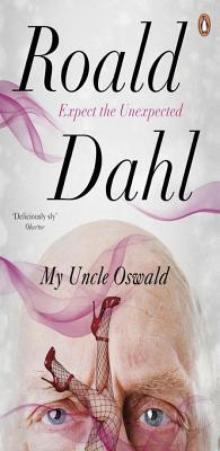 My Uncle Oswald
My Uncle Oswald The Best of Roald Dahl
The Best of Roald Dahl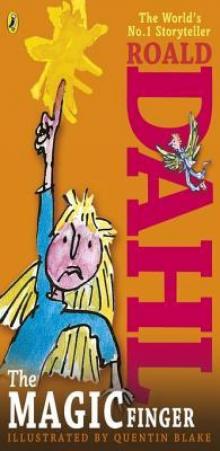 The Magic Finger
The Magic Finger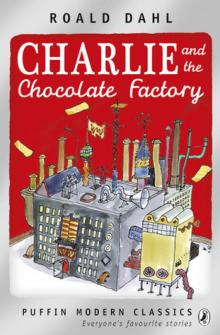 Charlie and the Chocolate Factory
Charlie and the Chocolate Factory Fantastic Mr Fox
Fantastic Mr Fox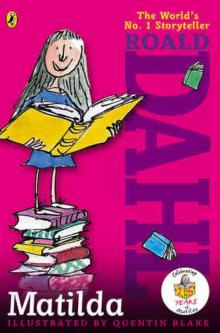 Matilda
Matilda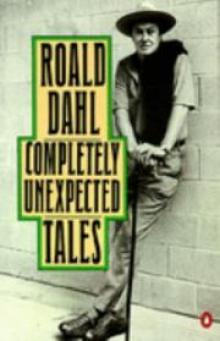 Completely Unexpected Tales: Tales of the Unexpected. More Tales of the Unexpected
Completely Unexpected Tales: Tales of the Unexpected. More Tales of the Unexpected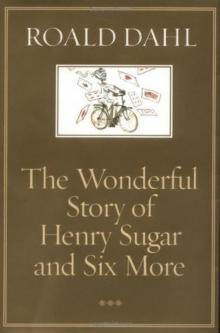 The Wonderful Story of Henry Sugar and Six More
The Wonderful Story of Henry Sugar and Six More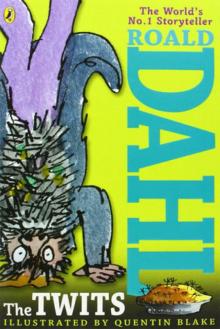 The Twits
The Twits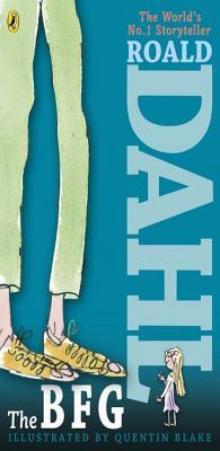 The BFG
The BFG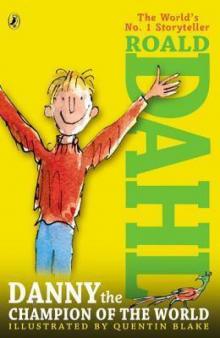 Danny the Champion of the World
Danny the Champion of the World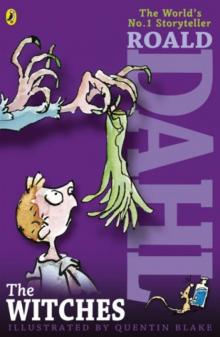 The Witches
The Witches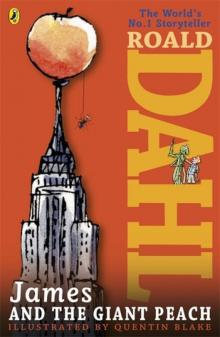 James and the Giant Peach
James and the Giant Peach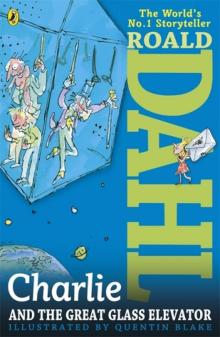 Charlie and the Great Glass Elevator
Charlie and the Great Glass Elevator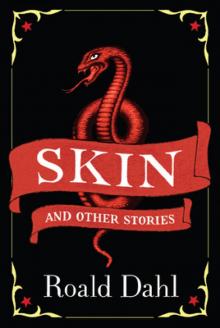 Skin and Other Stories
Skin and Other Stories Kiss Kiss
Kiss Kiss Switch Bitch
Switch Bitch The Giraffe and the Pelly and Me
The Giraffe and the Pelly and Me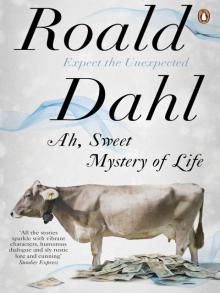 Ah, Sweet Mystery of Life
Ah, Sweet Mystery of Life Fear
Fear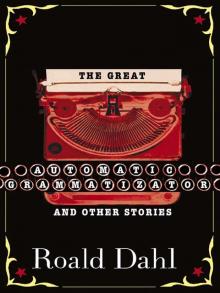 The Great Automatic Grammatizator and Other Stories
The Great Automatic Grammatizator and Other Stories Someone Like You
Someone Like You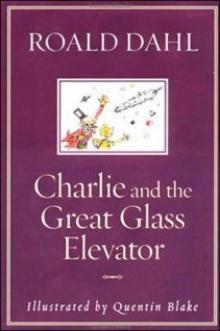 Charlie and the Great Glass Elevator c-2
Charlie and the Great Glass Elevator c-2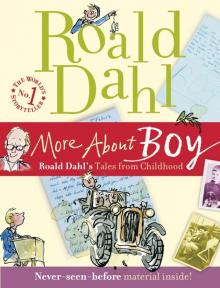 More About Boy
More About Boy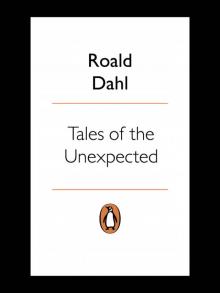 Tales of the Unexpected
Tales of the Unexpected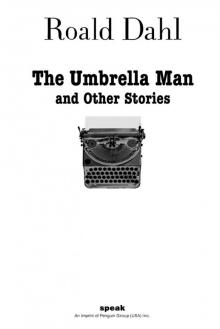 The Umbrella Man and Other Stories
The Umbrella Man and Other Stories Dirty Beasts
Dirty Beasts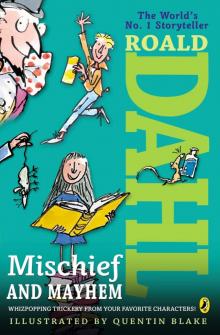 Roald Dahl's Mischief and Mayhem
Roald Dahl's Mischief and Mayhem The Collected Short Stories of Roald Dahl, Volume 1
The Collected Short Stories of Roald Dahl, Volume 1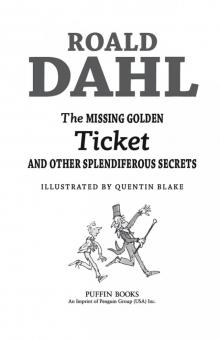 The Missing Golden Ticket and Other Splendiferous Secrets
The Missing Golden Ticket and Other Splendiferous Secrets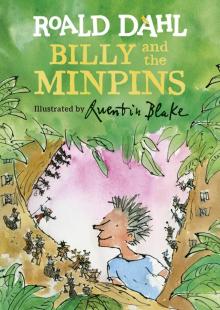 Billy and the Minpins
Billy and the Minpins Over to You
Over to You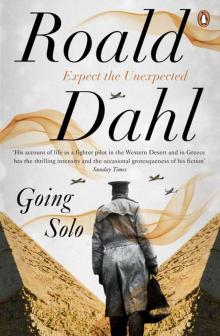 Going Solo
Going Solo Deception
Deception War
War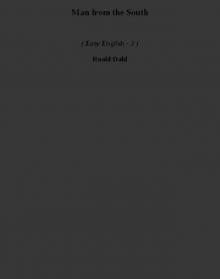 Man from the South ee-3
Man from the South ee-3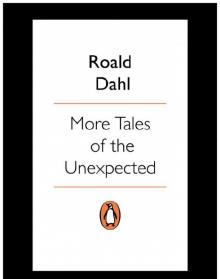 More Tales of the Unexpected
More Tales of the Unexpected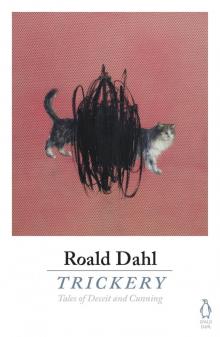 Trickery
Trickery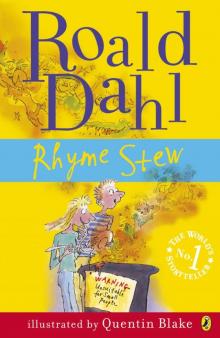 Rhyme Stew
Rhyme Stew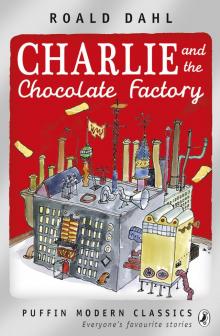 Charlie and the Chocolate Factory (Puffin Modern Classics relaunch)
Charlie and the Chocolate Factory (Puffin Modern Classics relaunch)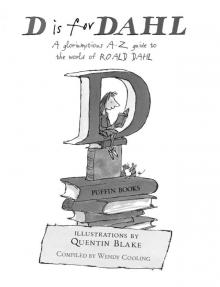 D is for Dahl
D is for Dahl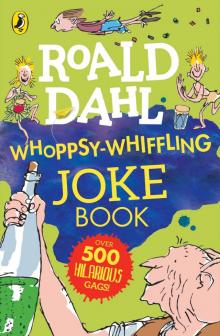 Roald Dahl Whoppsy-Whiffling Joke Book
Roald Dahl Whoppsy-Whiffling Joke Book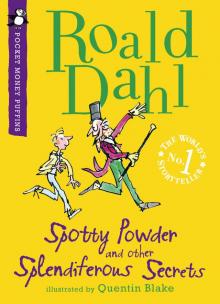 Spotty Powder and other Splendiferous Secrets
Spotty Powder and other Splendiferous Secrets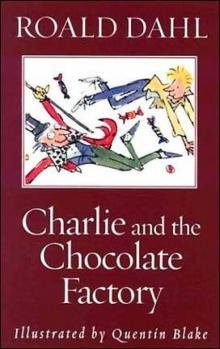 Charlie and the Chocolate Factory c-1
Charlie and the Chocolate Factory c-1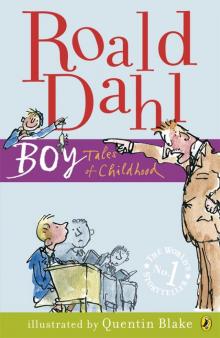 Boy
Boy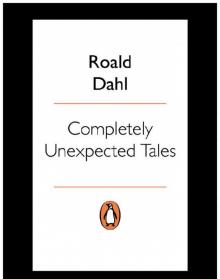 Completely Unexpected Tales
Completely Unexpected Tales Madness
Madness Innocence
Innocence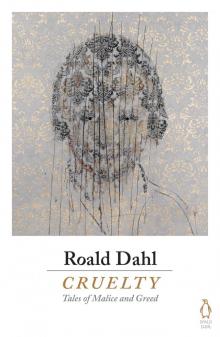 Cruelty
Cruelty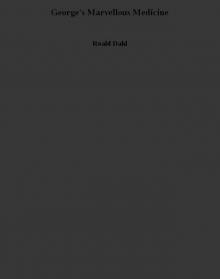 George's Marvellous Medicine
George's Marvellous Medicine